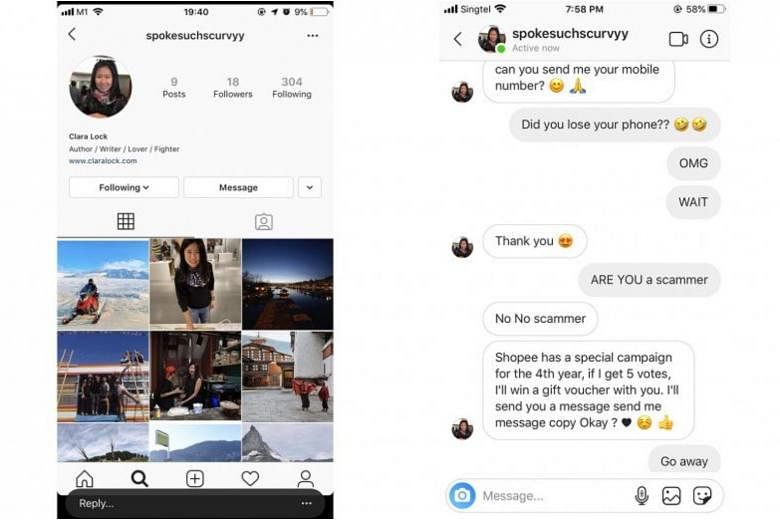The Instagram account looked suspiciously like my own.
"Did you just ask for my number?" asked one friend.
"Hey, is this you?" said another, sending me a screenshot of the account whose profile picture, description and photos displayed were identical to mine.
Only the username, which differed by a single letter, gave it away.
Someone was impersonating me and adding my contacts en masse.
Most of my friends smelt a rat or were warned off by my replies to block and report the imposter. But one friend began receiving messages asking for her mobile number.
Thinking I had lost my phone, she almost complied but grew suspicious when "I" asked for the contents of a text message to claim a prize from e-commerce site Shopee.
There was, of course, no prize to be had.
One-time password (OTP) scams, where victims were tricked into divulging their OTPs for online transactions, are one of many con jobs on the rise.
Last year, 1,101 people lost about $15.3 million to OTP scams, said the police. This is about four times the number of victims and 33 times the amount lost, compared with 2018.
With the coronavirus wreaking havoc in communities around the world and more people having to shop online, OTP scams look set to grow.
When friends reported the imposter to Instagram, the social media site revealed that it has "fewer people available to review reports because of the coronavirus pandemic".
In Singapore, fraudsters took advantage of the confusion surrounding safe distancing and circuit breaker measures to spawn at least 10 Covid-19-related scams in the last two months.
These include masquerading as government officials to collect fines, cheating buyers of surgical masks and hand sanitisers by not delivering the goods and creating bogus Covid-19-related cash give-aways to trick victims into giving away their Internet banking user ID, PIN and account number.
Dr Shawn Ee, director of The Psychology Practice, says such scams are effective as they contain an element of truth.
"These scams call to mind familiar and relevant social concerns in unsuspecting individuals, such as flouting pandemic transmission precautions, which can realistically lead to hefty fines," says Dr Ee, who is also a clinical psychologist and psychoanalytic therapist.
He adds that people tend to trust credible, knowledgeable experts such as Singapore's government officials.
Mr Tin Aung Win, a Lead Specialist (Cyber Security) at Nanyang Polytechnic's School of Information Technology, says: "Individuals are already under significant stress brought about by the pandemic and are more likely to let their guard down and become easy targets for scammers.
"In addition, competent scammers will ensure that they identify their potential victims and study their weaknesses before exploiting them."
Crime syndicates also constantly evolve and update scams to the current climate. With people doing more online shopping under the circuit breaker, fraudsters have tried their luck with delivery-related phishing scams of late.
Freelance arts practitioner S. Kwek, 29, fell prey to one such scam about two weeks ago, when she was asked to top up $3 worth of delivery charges on a fake SingPost site.
Thinking it was for an item she had recently purchased, she made the payment, but realised her credit card had been charged an additional $108.
"My impression of scams are blatant get-rich-quick ones that target older folks. I never thought I would become a victim," says Ms Kwek, who did not want to reveal her full name.
Although scams generally target the elderly and those who are less IT-savvy, the younger generation, which spends more time online and relies more heavily on e-commerce, are just as vulnerable.
Ms Kwek, for instance, made the payment in the middle of an online workshop, without giving it her full attention.
"I thought I could multitask, but when we are busy and tired, we are the most susceptible," she says.
Mrs E. Tan, 28, a social worker, had a similar experience.
She, too, was in the middle of a video call when a "friend" added her on Instagram and asked for her mobile number and OTP.
Distracted by the call, she did not read the texts in detail. She thought her "friend" needed the information to win a contest and revealed about eight OTPs as well as her debit card details before realising something was amiss.
By then, about a thousand dollars had gone missing from her bank account.
"I considered myself vigilant and never imagined there would be scammers on Instagram, a platform I considered safe," says Mrs Tan.
Indeed, fraudsters are becoming ever more nimble.
A conversational tone, a few emojis and some casual typos all conspire to make the recipient let their guard down.
After all, these are people who think they are talking to someone they know.
When a friend of mine called out the imposter, they were quick to change tack.
"Are you a scammer?" she asked. "No no not scammer," came the swift reply.
Within minutes, the whole profile was overhauled and the scammer began impersonating someone else.
I didn't even get a chance to report the fake account. It was like a sick game of whack-a-mole, where the scammers will not stop until they have their next victim.
Instagram did not respond to queries from The Sunday Times, but states on its app, in response to reports, that: "We're trying to prioritise content with the most potential for harm."
But for Mrs Tan, the damage has already been done.
"I don't expect to get back the money. I spent $1,100 to learn a lesson," she says.
5 common Covid-19-related scams
1 THE FAKE OFFICIAL
Fraudsters impersonate officials from various government agencies and try to trick victims into paying a fine or disclosing personal information.
In one version, callers impersonating Ministry of Health officials tell victims that China officials have seized parcels, registered under the victims names, that contain contraband medicine to treat the coronavirus.
They trick victims into revealing their NRIC numbers, passport details and Internet banking credentials in order to clear their names.
In another version, scammers pose as representatives of "SGUnite" and send e-mails alleging that recipients have been identified leaving their homes and are liable to fines amounting to $150. The e-mail contains unverified links for the payment of these fines.
How to avoid this: Be extra cautious when receiving unexpected international calls, which have been prefixed with a plus sign since the middle of last month.
Do not give personal information such as NRIC numbers, passport details and Internet banking credentials. No government agency will request these details or the transfer of money over the phone or through automated voice machines.
2 THE CASH GIVEAWAY
Supermarket chain Sheng Shiong giving away $250 coupons as Covid-19 relief; $15,000 worth of government handouts, in denominations of $500 - but only the first 30 people can claim it.
These are all scams promising cash giveaways, often advertised on social media at a time when the Government has announced moves to help people and businesses during the pandemic.
The scams trick victims into revealing their Internet banking details and one-time passwords (OTPs) to receive the money. Scammers use the information to make unauthorised transactions with the victims' bank accounts.
How to avoid this: The old adage applies - if something sounds too good to be true, it probably is.
Beware of unusual requests or offers from strangers and even known social media contacts as they may be spoofed.
Verify the authenticity of such messages by checking with friends or family members offline, or via official government sources. The public can sign up to receive official updates through the Gov.sg WhatsApp platform at go.gov.sg/whatsapp
3 THE FAILED DELIVERY
Victims receive a text message asking them to verify a delivery or top up postage fees for an item they have ordered.
They are asked to enter credit card details or OTPs on a fake postal delivery website, which leads to this information falling into scammers' hands.
While this scam is not new, it has resurfaced recently as e-commerce has picked up during this pandemic.
How to avoid this: Check the web address and URL bar. Legitimate sites should have encrypted addresses starting with https rather than http - the "s" stands for secure - as well as a lock icon in the address bar.
If in doubt, check the delivery provider's main website. SingPost, for instance, warns customers about phishing scammers who impersonate companies with fake delivery notices and text messages to extract personal data.
4 THE FRIEND IMPERSONATION
Fraudsters create a social media account impersonating one of your contacts, complete with an identical profile picture and social media posts.
The "friend" adds you on a social networking site and messages you to ask for your mobile number. He then asks you for an OTP, citing various reasons such as to enter a contest or claim a prize together.
This scam is not new either, but looks to continue rising as social media companies' moderation capabilities have been compromised by the pandemic.
How to avoid this: If a friend adds you on social media with a new account or requests your mobile number, test them with a "secret question" that scammers would not know the answer to. Better still, do this over a phone call.
5 THE E-COMMERCE CHEAT
Looking to purchase face masks or hand sanitiser? Make sure you are not buying into a scam instead.
Police say they have received multiple reports of people paying for these items on online marketplace Carousell, only for the sellers to disappear without delivering the goods.
How to avoid this: When ordering items online, look for sellers with good reviews and use the in-app payment function CarouPay. Your payment will not be released to the seller until you confirm that you have received the item as listed.
• If you suspect a scam, or want to stay updated on new ones, go to scamalert.sg


